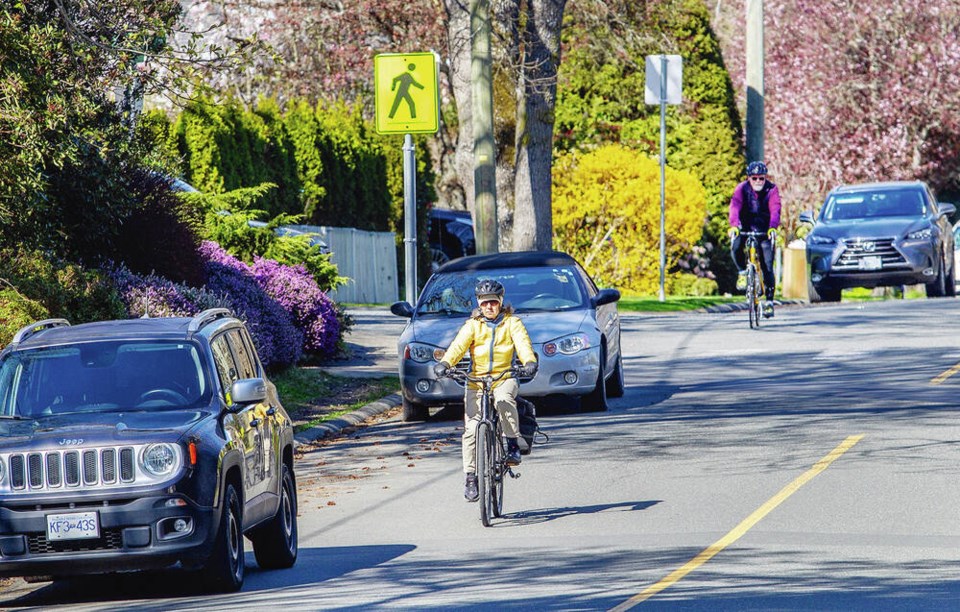Oak Bay has backpedalled on funding staff for cycling transportation improvements in this year’s budget just days after it settled on a five-year plan on cycling infrastructure.
On Monday, council decided on a five-year plan to improve nine cycling routes after hours of deliberation.
But three days later, council narrowly voted in favour of halving the staff allocated for the initiative in a bid to avoid a double-digit tax increase.
Mayor Kevin Murdoch said the move was made to lower the projected Oak Bay tax increase, which had gone up to a projected 10.4 per cent this year. “Our net budget was creeping up,” he said.
The staffing level change was one of several decisions made Thursday to move projects forward, but still keep the tax increase below nine per cent, he said.
Coun. Carrie Smart, who voted against cutting the funds, said the original plan would have cost $250,000.
“The mayor had voted on Monday to go ahead with the five-year implementation plan which would have needed two staff members, and then his vote changed in the budget deliberations,” Smart said.
The active transportation plan’s tax impact was reduced to $188,100, or 0.57 per cent of the total planned tax increase, in a 4-3 vote.
Doug Baer, co-chair of Capital Bike’s advocacy committee, applauded council’s decision to improve nine cycling routes, saying Oak Bay is “finally taking active transportation seriously.”
But the decision to reduce staff allocation is disappointing, he said.
“Implementation is going to be slower. There’s no question about it,” he said. “In terms of staff support, you’ve cut what you promised to do in half. It may not be terrible if they bring the level up to two people soon.”
Murdoch said he could see a ramp up in staff occurring next year, adding that the first year will largely be focused on conceptual design and consultation work.
Planning for cycling projects has to fit with the ongoing need for work on Oak Bay’s aging underground infrastructure, he said. “We don’t want to get in the situation where we’re building bike lanes and then ripping them a year or two later to put in pipes.”
That approach can be seen on McNeill Avenue, where underground work is being done in advance of a cycling and traffic-calming project that has received about $220,000 in funding from the province through its Active Transportation Infrastructure Grants program.
“Once that’s done, we’ll put in the multi-use infrastructure on top,” Murdoch said.
The McNeill project will extend from Victoria Avenue to Transit Road, with the first phase featuring shared-use bike lanes and improvements aimed at pedestrian safety.
Of the nine cycling routes identified, some are upgrades to existing routes, such as the Foul Bay/Henderson corridor and Cadboro Bay Road, Murdoch said.
“We’re going to try to get the core nine projects prioritized, which are the main corridors and a few other pieces,” he said.
Murdoch said Oak Bay has set aside $1.75 million for capital costs, enough for about two years of improvements.
Grants will be needed to fully fund the projects, he said. “The intention is to do it in five years. It’s going to be tough, no matter what.”
Murdoch said there has been considerable public input on cycling matters, with some people pointing out how bike-lane use has changed.
“Now we have e-bikes and e-scooters going at much higher speeds, so the contemplation of things like room to pass and speed is quite different than it used to be,” he said.
Jane van Hoorne, an Oak Bay cycling advocate, said while she feels hopeful about the five-year plan, she’ll continue organizing Critical Mass protest bike rides to municipal hall until she sees actual change in Oak Bay’s cycling infrastructure.
Van Hoorne noted that it took six years of advocacy to get a part-time bike lane on Henderson in the 2000s.
Still to be completed are plans for sidewalks and pedestrian travel in the municipality.
Smart said in some ways Oak Bay is still looking at the same infrastructure improvements 13 years after they were first suggested in its 2011 active transportation plan.
“There’s still a lot of us on council that are very passionate about active transportation,” she said. “But there’s definitely a diversity of opinions around the table.”
>>> To comment on this article, write a letter to the editor: [email protected]



